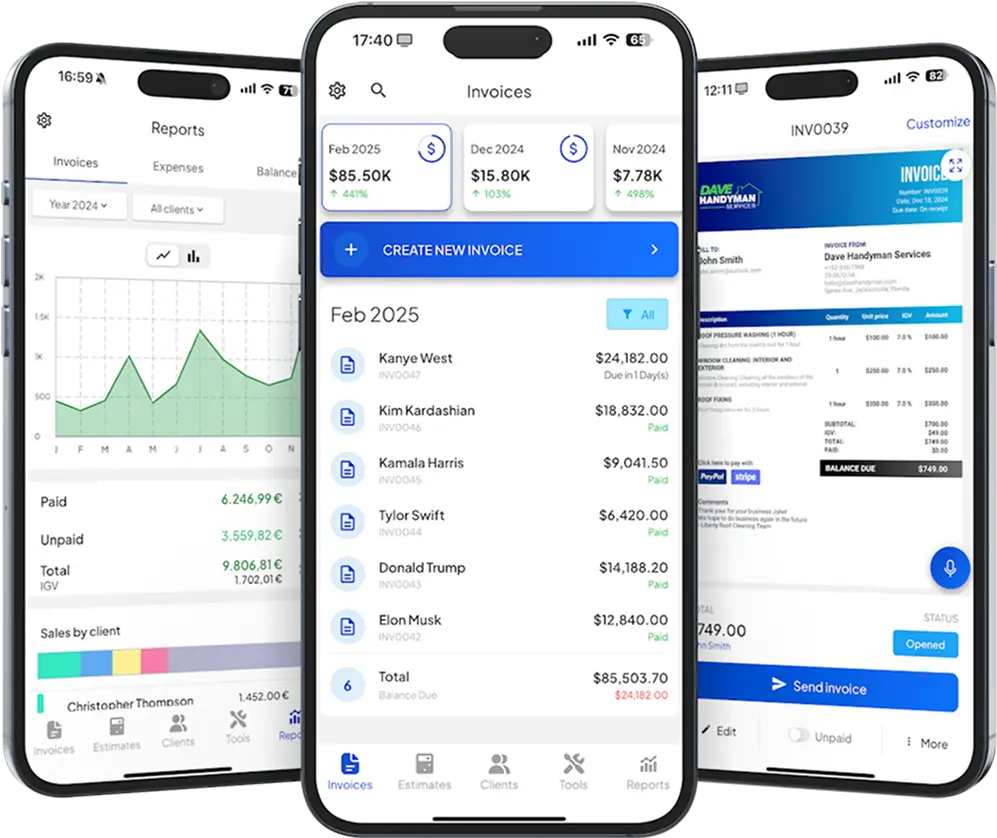How To Start Your Own Cleaning Business: Step-by-Step Guide

Table of Contents
- Why Start a Cleaning Business?
- Send Invoices in Seconds
- Step 1: Research and Planning
- Step 2: Legal Requirements
- Step 3: Gather Equipment and Supplies
- Step 4: Set Your Pricing Structure
- Step 5: Develop a Marketing Strategy
- Send Invoices in Seconds
- Step 6: Hiring and Training Staff
- Step 7: Manage Your Operations and Invoices
- Step 8: Scale Your Business
- Final Thoughts to Start a Cleaning Business
Are you about to become a business owner and start a cleaning business? You’re on to something great!
With the rising demand for professional cleaning services in homes and offices, 2026 is the perfect time to get started. In fact, the cleaning industry in the U.S. alone is projected to grow by 6% annually, driven by post-pandemic hygiene awareness and an increasing number of dual-income households.
This guide covers everything you need to know to start a successful cleaning company. Whether it’s home cleaning, carpet cleaning, or window cleaning, this info will help you get started on the right foot.
Why Start a Cleaning Business?
Starting a cleaning company comes with plenty of perks.
First off, it’s more affordable to start compared to many other ventures, thanks to its low startup costs. For instance, your start up costs could be as little as $1,000 by investing in basic equipment and supplies. Or scale up to $10,000 if you’re targeting commercial clients.
Plus, there’s a high demand for cleaning services as people remain highly focused on hygiene post-pandemic. If you’re looking for a way to get back in the workforce but don’t want to work in retail, this could be a perfect fit.
Let’s take Sarah, for example. After losing her retail job during the pandemic, she launched a small home cleaning business in her local community.
Starting with just a vacuum cleaner, eco-friendly cleaning products, and some printed flyers, she quickly built a loyal client base. Today, Sarah’s Cleaning Services employs five people and serves both residential and commercial clients.
A cleaning business also gives you the flexibility to start small and scale up as you grow.
Whether you’re interested in residential cleaning, commercial cleaning, or niche services like carpet and window cleaning, there’s plenty of room to carve out your own profitable niche.
RELATED ARTICLE: How Much Do House Cleaners Make in 2026?
Send Invoices in Seconds
Set up in 1 minute, send invoices in 2 — it’s that simple with Invoice Fly.

Step 1: Research and Planning
Before jumping in, it’s essential to do your homework.Understanding the market will help you identify opportunities, spot the competition, and discover what potential customers are looking for.
Analyze your Market
- Define your target market audience: Are you focusing on residential cleaning, office spaces, or specialized services like carpet or window cleaning? For instance, suburban homeowners might prefer weekly residential cleanings, while city businesses often need nightly janitorial services.
- Check out the competition: See what other cleaning businesses in your area are doing. What are their prices, what services do they offer, and what do customers say about them? For example, if your competitors charge $100 for deep cleaning, you might offer a similar service for $90 during your launch phase to attract customers.
- Assess demand: Make sure there’s enough demand for the services you plan to offer. If you live in a growing community with new housing developments or office parks, the potential for cleaning contracts is higher.
Create a Business Plan
Your business plan is your roadmap to success.
Be sure to include:
- Mission statement: What values and goals will your business uphold? For example, GreenSpark Cleaning Services aims to provide eco-friendly and high-quality cleaning solutions for busy families and businesses
- Services you’ll offer: List your main services and any add-ons. Decide whether you’ll specialize in residential cleaning, commercial cleaning, or niche services. Offering eco-friendly cleaning options can also attract health-conscious clients.
- Budget: Plan for startup costs, ongoing expenses, and projected income. For example, your initial costs might include purchasing a commercial vacuum ($300), cleaning supplies ($200), and marketing materials ($500). Use our Salary Calculator to quickly estimate your yearly gross salary based on taxes.
- Marketing strategy: Outline how you’ll attract and keep customers. For instance, you might start with social media ads offering 10% off first-time bookings.
- Select a company name: Here you have the best cleaning company name ideas for your business.

Try our Salary Calculator
Step 2: Legal Requirements
Meeting all necessary legal requirements ensures smooth operations and builds trust with clients. Here’s what to keep in mind:
Register Your Business
- Pick the best business structure: Choose between becoming a self-employed individual, LLC, or partnership, each with its own tax and legal implications. For example, setting up an LLC can protect your personal assets in case of legal claims.
- Choose a memorable name: Make it simple and relevant to your services. Try something like “Spotless Solutions” or “Pristine Clean Co.”
- Register with the proper authorities: Follow local and state regulations to make your business official. Check your state’s small business resources to ensure compliance.
RELATED ARTICLE: Cleaning Contracts
Get Licenses and Permits
- General business license or cleaning business license: Typically required in most states.
- Special permits: If you plan to use industrial cleaning chemicals, some states require additional permits.
Insurance is a Must
- General liability insurance: Protects against damage or injury claims. For example, if you accidentally damage a client’s carpet, insurance covers the repair.
- Workers’ compensation: Required if you’re hiring employees.
- Bonding: Adds an extra level of trust for your clients, especially for commercial contracts.

Step 3: Gather Equipment and Supplies
Having the right tools is essential for delivering high-quality services efficiently. The equipment you need will depend on your services.
Basic Cleaning Supplies
- Cleaning products: Stock up on all-purpose cleaners, disinfectants, and eco-friendly solutions. Clients appreciate non-toxic options, especially in homes with pets or children.
- Tools: Mops, brooms, vacuums, and microfiber cloths are must-haves.
- Protective gear: Gloves, masks, and safety goggles are essential.
RELATED ARTICLE: Essential Office Cleaning Supplies
Specialized Equipment
- Carpet cleaning: Invest in steamers and stain removers for deep cleaning jobs.
- Window cleaning: Use squeegees, extension poles, and eco-friendly solutions for spotless results.
- Floor cleaning: Consider a ride-on floor scrubber to clean large spaces efficiently.
Step 4: Set Your Pricing Structure
Getting your pricing right is crucial. Price too high, and you might scare off potential clients; too low, and you risk undermining your profitability. Research your local competition and consider the value you’re bringing to the table.
Common Pricing Models
- Hourly rates: Charge based on the time taken to complete a job. General home cleaning rates might range from $25 to $50 per hour, depending on the location and job complexity.
- Flat rates: Offer fixed prices for specific services, like home or carpet cleaning. For example, a standard three-bedroom house cleaning might cost between $150 and $250. Carpet cleaning for a typical living room could range from $80 to $120.
- Square footage: Ideal for larger spaces, like office buildings. Rates could be between $0.10 to $0.25 per square foot. Cleaning a 10,000-square-foot office might cost between $1,000 and $2,500, depending on the scope.
RELATED ARTICLE: How Much To Charge for House Cleaning in 2026.
RELATED ARTICLE: How to price Window Cleaning Jobs

Step 5: Develop a Marketing Strategy
To grow your business, you need to get noticed. Here’s how to effectively market your services:
Build Your Online Presence
- Create a professional website: Highlight your services, contact details, and glowing client testimonials.
- SEO optimization: Use relevant keywords like ‘home cleaning in Tucson’ to boost your visibility in search results.
- Social media: Post before-and-after photos, run promotions, and share client feedback on platforms like Facebook and Instagram to engage followers.
Networking
- Team up with real estate agents: They can refer your services to clients in need.
- Join local business groups: These can lead to valuable referrals.
Listings and Reviews
- Register on directories: Add your business to Google My Business and other local directories.
- Ask for reviews: Positive feedback on Google and Yelp can go a long way.
Send Invoices in Seconds
Set up in 1 minute, send invoices in 2 — it’s that simple with Invoice Fly.

Step 6: Hiring and Training Staff
As your business grows, hiring the right team is essential for maintaining quality. Here’s what to consider:
Tips for Hiring
- Look for experienced cleaners: This saves training time and ensures high service standards.
- Run background checks: Builds trust with your clients.
- Offer competitive pay: A starting wage of $15–$20 per hour can attract top talent.
Training Your Team
- Standard procedures: Develop step-by-step cleaning checklists for uniform quality.
- Customer service training: Equip staff with soft skills to handle client interactions.
Step 7: Manage Your Operations and Invoices
Your priority should be serving your clients—not battling complex software. That’s why having the right business tools is essential. Invoice Fly’s Software for Cleaning Businesses streamlines your operations, making it easy to:
For instance, if you clean a client’s home weekly, software can automate invoice generation and payment reminders, saving you time.

Step 8: Scale Your Business
With your business running smoothly, it’s time to think about scaling up. Expanding your operations can open up new revenue streams and solidify your presence in the market.
Here are some areas to grow your cleaning business:
- Residential cleaning business: Expand to nearby suburban areas where there may be fewer options. For example, if you’re operating in downtown Dallas, branch your house cleaning business out to Plano or Frisco.
- Commercial cleaning business and contracts: Target growing office parks or industrial areas. Landing a contract with a mid-sized office complex could bring in steady monthly income.
- Specialized services: Add services like post-construction cleanups or eco-friendly deep cleans. For example, “GreenSpark Cleaning Services” offers a unique package for allergy sufferers using hypoallergenic products.
- Scale to new cleaning services: Discover the different types of cleaning services available.
RELATED ARTICLE: Best Window Cleaning Tools
Final Thoughts to Start a Cleaning Business
Starting a cleaning business in 2026 is packed with potential.
With a solid plan, the right legal and insurance foundation, and the right tools, you can build a profitable and trusted company.
Remember Sarah? She started with just a vacuum and some flyers but now runs a thriving business.
Download Invoice Fly today!
